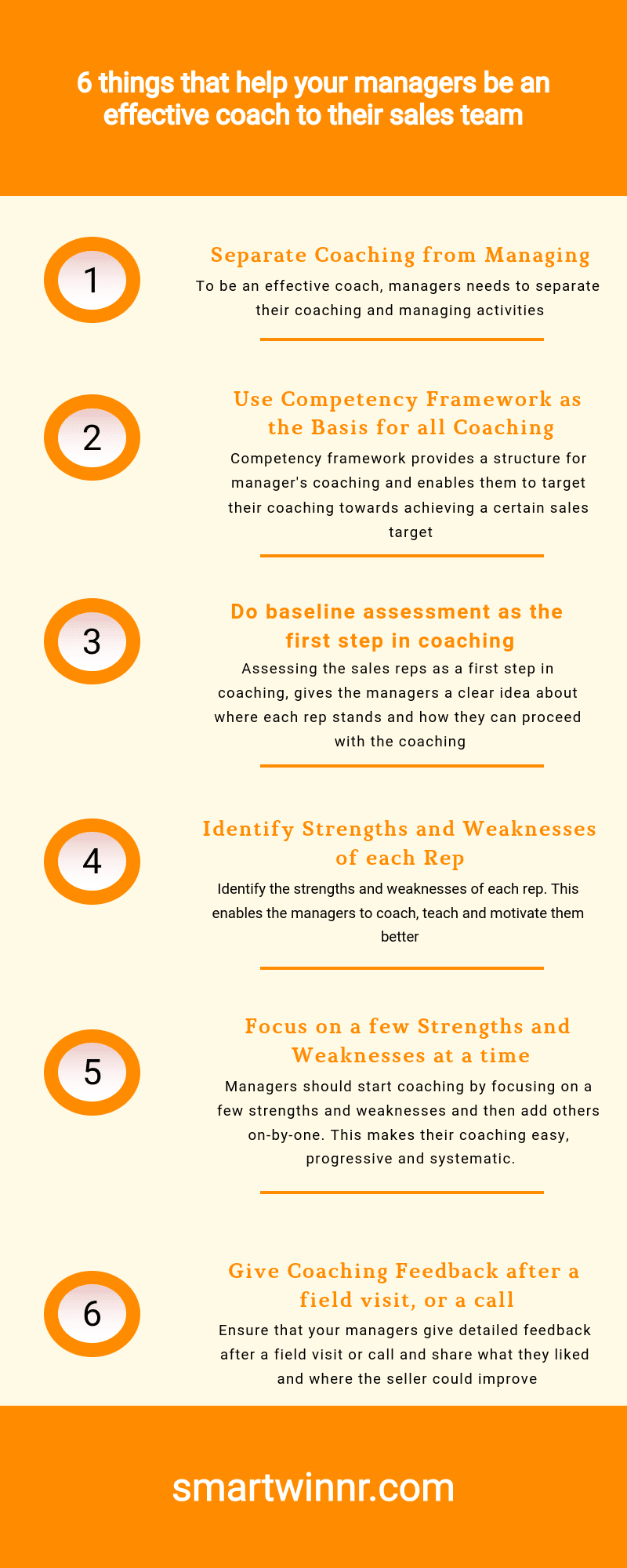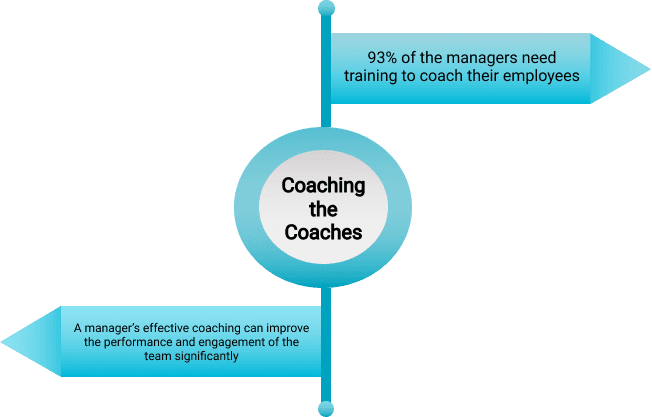This article is the continuation of the sales coaching playbook part-1. In the previous article, we have focussed on creating a structured competency framework for coaching the sales team. In this post, we will look into how to train your front-line sales managers to properly coach their sales team. Refer to part-1 Let us begin looking at the coaching scenario from a manager’s perspective Sales manager are jugglers. They find themselves managing a lot of things in a day. They have the responsibility of managing numbers, studying spends, managing a team, watching existing accounts and tracking new businesses. In this array of job function, a sales manager’s role as a coach is given less priority. But, coaching is very crucial in growing and developing the sales team. In fact, according to the LinkedIn survey:
Coached reps attain quota at an average rate of 22%-26% higher than their non-coached peers.
Majority of reps (60%) say they could use more coaching than what they receive from their managers
Therefore, we believe that the primary responsibility of a sales manager is to turn talent into performance. And, they can do that by being an outstanding coach. Coaching a sales team is a lot like coaching a sports team. In both cases, coaches have to balance varying levels of skill among the team, put routine practices in place to help them achieve peak performance, and ultimately lead them to a winning season or quarter. In order for managers to implement such an effective coaching, they have to be provided with a well-rounded and well-structured training program. This training program should focus on:
How to distinguish between the role of a sales coach and sales manager
How to use the competency framework as the basis for all coaching
How to do a baseline assessment as the 1st step
How to identify the areas of strengths and areas of weaknesses of every salesperson
How to focus on a few weaknesses and strengths at a time
How to give coaching feedback after observing the salesperson during a field visit, or a call
Train them to distinguish between coaching and managing
To coach effectively, sales managers need to first understand the distinction between coaching and managing. A coach takes on a much more dynamic role than a manager. A manager is responsible for overseeing all the day-to-day tasks in terms of managing sales and numbers. Their primary focus is to get their salespeople to make numbers. On the other hand, a coach focuses on developing and motivating a sales person and help them to grow professionally. Sales managers need to understand when to manage and when to coach. Here are a few things to keep in mind to separate coaching from managing:
Instead of focusing on what they see as sales managers (which is really a performance review), focus on the areas in which the salesperson wants to focus.
Build the salesperson. Help them understand their blind spots and help them identify new possibilities, new choices, new beliefs, and new behaviors.
Use non-directive coaching. Let the sales reps think about how they will improve. The job of a Sales manager is to help them take the decisions they need and hold them accountable.
Train them to use the competency framework as the basis for all coaching
Train the managers to use the competency framework as a basis for all the coaching they do. This framework provides a structure for their coaching. It enables them to focus their coaching efforts on developing those skills. This competency framework should be used for regular coaching for the entire year. Conduct a 1-day training session with the manager and train them on the competency framework. Explain in detail about how the framework works, the descriptors, the scoring etc– refer to the sales coaching playbook part 1. Give an example about how these competencies will be different for an experienced sales person vs a new joinee. Here is an example of how the competencies look like for a new joinee and an experienced person.
Jane Smith (experienced sales person, new to the company) | John Wayne (new joinee, new to selling) | Alice Lee (Experienced sales person, 3 years in the company) | |
|---|---|---|---|
Product Knowledge | Level1 | Level1 | Level2 |
About Industry | Level3 | Level1 | Level2 |
Handling Objections | Level3 | Level1 | Level3 |
Train them to do baseline assessment as the first step in coaching
The first step in coaching should be to assess the sales reps against the set competencies. This gives the managers a clear idea about where each rep stands with regards to these competencies. For example, a new sales rep in their team will be at level-1(L1) or level-2(L2) in handling objections. Whereas, an experienced sales rep might be at L3 or L4. Different people in the team will have different experiences and knowledge levels. This kind of assessment enables the managers to be able to customize their coaching path to suit the needs of each individual.
Also, it is important to do the baseline assessment along with the sales person. This ensures that her opinion is taken into consideration regarding her competencies. It puts the sales reps incharge of their own learning and engages them with the coaching.
Train them to identify the areas of improvements and strength
It is vital that your sales managers understand their sales reps inside and out. It means identifying each person’s natural abilities and creating strategies to maximize their innate strengths. It also means recognizing any weaknesses they may have. And, helping them improve on their areas of improvements.They must learn:
The goals of each individual sales rep in their team
Their strengths and areas of improvement
How each one of them prefers to receive coaching
What kind of recognition makes them feel good when they succeed
Also, use the descriptors to identify the competency level of each individual. refer to the sales coaching playbook part 1. to learn more about descriptors for each development level. This enables the managers to know their sales people as individuals. The more they know their reps, the better they will be able to coach, teach, and motivate them.
Train them to focus on a few weaknesses and strengths at a time
When coaching, managers should focus on improving 2 or 3 weaknesses and strengths at a time. Then move on to other strengths and weaknesses. For example, in the first month of coaching they can work with 3 competencies. Then, for the next month they can pick 3 other competencies to coach and so on. Also, these competencies have to be selected in such a way that there is a mixture of strengths and weaknesses. For example if they are selecting 3 competencies then, pick 2 weaknesses and 1 strength. This approach ensures that the managers are not de-motivating the reps by focussing on their weaknesses alone.
This structure provides a progressive and systematic approach to coaching. It also enables the managers to formulate a development plan which knocks down one objective at a time.
Train them on how to give coaching feedback after observing the salesperson during a field visit, or a call
Ensure that your managers commit to spending time regularly with the sales reps during a field visit or a call. Train them to
Utilize this time for coaching, rather than micromanaging
Schedule their field visits or call time together well in advance, so it does not come as a surprise.
Share very clear expectations regarding the purpose and intended outcome of this time together with the reps.
Observe the reps behaviour and skills in the field
Provide detailed feedback on what they saw that they liked and where the seller might make slight adjustments for improvements.

Looking for more on Sales Coaching PlayBook?
Sales Coaching PlayBook Part 1 - Competency Framework
Sales Coaching PlayBook Part 3 - How to Measure the Success of Coaching
Are you Planning to Implement Video Coaching in your Sales Process?
5 Reasons to use Video Coaching in your Sales Process
Best Practices to drive Video Coaching
Searching for Sales Coaching Templates?
Sales Coaching Template for Managers
What is the difference between a manager and a coach?
Coach or Manager? What does your team want?
SmartWinnr’s on-the-job coaching automates your sales coaching process. Plugin your own competency frameworks to measure and coach your sales teams. Managers play a crucial role in the coaching process. They do baseline assessments, set coaching goals for joint field visits, and provide crucial feedback to their sales reps.
Curious to learn more about it? Book a demo today!












